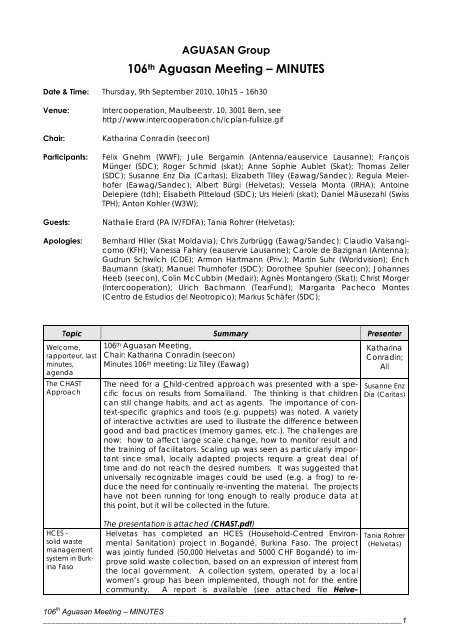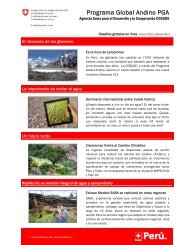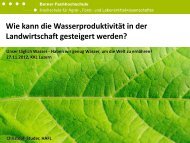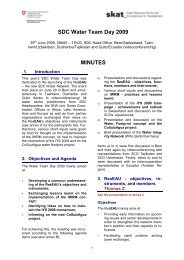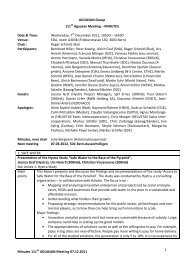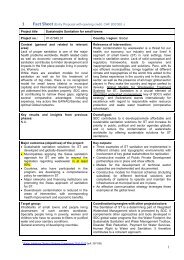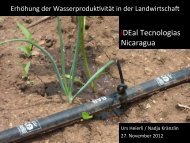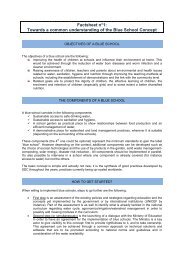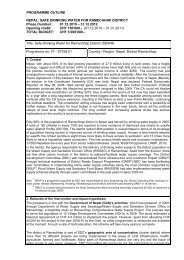106th Aguasan Meeting – MINUTES - SDC Water Network
106th Aguasan Meeting – MINUTES - SDC Water Network
106th Aguasan Meeting – MINUTES - SDC Water Network
Create successful ePaper yourself
Turn your PDF publications into a flip-book with our unique Google optimized e-Paper software.
AGUASAN Group<br />
106 th <strong>Aguasan</strong> <strong>Meeting</strong> <strong>–</strong> <strong>MINUTES</strong><br />
Date & Time:<br />
Venue:<br />
Chair:<br />
Participants:<br />
Guests:<br />
Apologies:<br />
Thursday, 9th September 2010, 10h15 <strong>–</strong> 16h30<br />
Intercooperation, Maulbeerstr. 10, 3001 Bern, see<br />
http://www.intercooperation.ch/icplan-fullsize.gif<br />
Katharina Conradin (seecon)<br />
Felix Gnehm (WWF); Julie Bergamin (Antenna/eauservice Lausanne); François<br />
Münger (<strong>SDC</strong>); Roger Schmid (skat); Anne Sophie Aublet (Skat); Thomas Zeller<br />
(<strong>SDC</strong>); Susanne Enz Dia (Caritas); Elizabeth Tilley (Eawag/Sandec); Regula Meierhofer<br />
(Eawag/Sandec); Albert Bürgi (Helvetas); Vessela Monta (IRHA); Antoine<br />
Delepiere (tdh); Elisabeth Pitteloud (<strong>SDC</strong>); Urs Heierli (skat); Daniel Mäusezahl (Swiss<br />
TPH); Anton Kohler (W3W);<br />
Nathalie Erard (PA IV/FDFA); Tania Rohrer (Helvetas);<br />
Bernhard Hiller (Skat Moldavia); Chris Zurbrügg (Eawag/Sandec); Claudio Valsangicomo<br />
(KFH); Vanessa Fahkry (eauservie Lausanne); Carole de Bazignan (Antenna);<br />
Gudrun Schwilch (CDE); Armon Hartmann (Priv.); Martin Suhr (Worldvision); Erich<br />
Baumann (skat); Manuel Thurnhofer (<strong>SDC</strong>); Dorothee Spuhler (seecon); Johannes<br />
Heeb (seecon), Colin McCubbin (Medair); Agnès Montangero (Skat); Christ Morger<br />
(Intercooperation); Ulrich Bachmann (TearFund); Margarita Pacheco Montes<br />
(Centro de Estudios del Neotropico); Markus Schäfer (<strong>SDC</strong>);<br />
Topic Summary Presenter<br />
Welcome,<br />
rapporteur, last<br />
minutes,<br />
agenda<br />
The CHAST<br />
Approach<br />
106 th <strong>Aguasan</strong> <strong>Meeting</strong>,<br />
Chair: Katharina Conradin (seecon)<br />
Minutes 106 th meeting: Liz Tilley (Eawag)<br />
The need for a Child-centred approach was presented with a specific<br />
focus on results from Somaliland. The thinking is that children<br />
can still change habits, and act as agents. The importance of context-specific<br />
graphics and tools (e.g. puppets) was noted. A variety<br />
of interactive activities are used to illustrate the difference between<br />
good and bad practices (memory games, etc.). The challenges are<br />
now: how to affect large scale change, how to monitor result and<br />
the training of facilitators. Scaling up was seen as particularly important<br />
since small, locally adapted projects require a great deal of<br />
time and do not reach the desired numbers. It was suggested that<br />
universally recognizable images could be used (e.g. a frog) to reduce<br />
the need for continually re-inventing the material. The projects<br />
have not been running for long enough to really produce data at<br />
this point, but it will be collected in the future.<br />
Katharina<br />
Conradin;<br />
All<br />
Susanne Enz<br />
Dia (Caritas)<br />
HCES -<br />
solid waste<br />
management<br />
system in Burkina<br />
Faso<br />
The presentation is attached (CHAST.pdf)<br />
Helvetas has completed an HCES (Household-Centred Environmental<br />
Sanitation) project in Bogandé, Burkina Faso. The project<br />
was jointly funded (50,000 Helvetas and 5000 CHF Bogandé) to improve<br />
solid waste collection, based on an expression of interest from<br />
the local government. A collection system, operated by a local<br />
women’s group has been implemented, though not for the entire<br />
community. A report is available (see attached file Helve-<br />
Tania Rohrer<br />
(Helvetas)<br />
106 th <strong>Aguasan</strong> <strong>Meeting</strong> <strong>–</strong> <strong>MINUTES</strong><br />
_____________________________________________________________________________________1
tas_Publication_AECM_Bogande_Fr_comp_final.pdf) and Tanja will<br />
provide more reports for review, later on. It was also noted that new<br />
HCES guidelines will be produced by Eawag-Sandec in the coming<br />
year and they should provide more concrete tools and help to simplify<br />
the process.<br />
Framework for<br />
an impact<br />
assessment of 3<br />
different intervention<br />
strategies<br />
used for<br />
scaling up<br />
HWTS, Hygiene<br />
and CLTS in<br />
Cholera prone<br />
areas in Kenya<br />
The presentation is attached (see file HCES-Bogande.pdf)<br />
Two projects were presented:<br />
1. Impact assessment of large-scale WASH promotion in choleraprone<br />
areas in Kenya. A 1.5 year evaluation of the impact of WASH<br />
programs will be started. The project will not only address SODIS but<br />
will include different technologies, e.g. membrane systems. The<br />
challenge faced now is working in cholera-prone districts where<br />
products were distributed for free, and where there will now be resistance<br />
to paying. Unicef will be doing the implementation and 3ie<br />
(international initiative for impact evaluation).<br />
Regula<br />
Meierhofer<br />
(Eawag/<br />
Sandec)<br />
Globally scaling<br />
up WASH<br />
through a<br />
household<br />
centred approach<br />
Recent developments<br />
regarding<br />
the<br />
human right to<br />
water<br />
2. Project proposal: Scaling up WASH improvements through a<br />
household-centered approach based on demand and behaviour<br />
change<br />
The proposal addresses the integration of experiences from previous<br />
approaches for promoting WASH, to address the current shortcomings<br />
in meeting the MDGs. Ideally, the project would last for 2 years<br />
and would be carried out in 4 countries (2 African, 1 Asian, 1 Latin<br />
American). The goal of the project would be to improve WASH conditions<br />
of one million underserved people in the rural areas of lowincome<br />
countries with a proven framework, approach and methodologies<br />
for implementation “at scale”. Specifically, the project would<br />
result in improved strategies, documentation and capacities and<br />
would result in improved WASH conditions for 1 million people with<br />
proven methodologies for scaling up and a strengthened, more empowered<br />
political sector.<br />
The two presentations Scaling up WASH_RM.pdf and Impact Assessment_RM.pdf<br />
are attached.<br />
The question of whether or not water is a “human right” has been<br />
discussed at the General Assembly of the United Nations and a resolution<br />
has been adopted, but what it means is not clear, i.e. the<br />
scope, the technical details etc. Does the “right to water” necessarily<br />
mean “free water”? this is the question. Usually, a resolution must<br />
be passed by consensus, but in this case, the US asked for a vote:<br />
122 countries in Favour. No countries voted against and 41 countries<br />
abstained (including the US, UK, Australia, Netherlands and Canada<br />
:-( Switzerland and Liechtenstein voted in Favour :-) There will<br />
now be rigorous discussion and negotiation about the definitions, the<br />
inclusion of the informal sector, etc. It was noted that <strong>SDC</strong> uses the<br />
WHO definition of 20L/person/day, though every country defines its<br />
own quality, quantity, accessibility, affordability, and cultural measures<br />
of water provision. The resolution is non-binding but it is a strong<br />
incentive and instrument.<br />
There is a report Report of the independent expert on the issue of<br />
human rights obligations related to access to safe drinking water<br />
and<br />
sanitation, Catarina de Albuquerque (see attached Human Right to<br />
<strong>Water</strong>_ENG.pdf)<br />
It was noted that this is 60 years after the Human Rights declaration<br />
François<br />
Münger<br />
(<strong>SDC</strong>)/<br />
Nathalie…<br />
106 th <strong>Aguasan</strong> <strong>Meeting</strong> <strong>–</strong> <strong>MINUTES</strong><br />
_____________________________________________________________________________________2
Swiss <strong>Water</strong><br />
Partnerships <strong>–</strong><br />
update and<br />
next steps<br />
Update on<br />
Solidarit’eau<br />
(which included water but not sanitation!)<br />
The goal of the SWP is to create a large partnership to be present at<br />
large events and to speak with one voice. In France, Holland and<br />
Germany there are partnerships, but they are more businessfocused.<br />
There have been discussions with Nestlé, Helvetas and<br />
various governmental agencies about the partnership, which will<br />
include a small secretariat, though it will not be hosted by <strong>SDC</strong>.<br />
There are now 60 municipalities funding water and sanitation projects<br />
in Developing countries and 40 which have the official “Solidarit’eau”<br />
label. They are the ones that give 1 cent/rappen/ cubic<br />
metre of water sold. So far Lausanne has given 130,000CHF to a project<br />
in Mauritania.<br />
François<br />
Münger<br />
(<strong>SDC</strong>)<br />
Julie Bérgamin<br />
/<br />
Thomas<br />
Zeller<br />
At the <strong>Water</strong> event on 15 September, there will be a Solidarit’eau<br />
stand which will be used to help push other municipalities to be included.<br />
On 24th November (mark your calendars!) there will be a presentation<br />
at <strong>SDC</strong> about the Lausanne project. A representative from Mauritania<br />
will be there and he is looking to learn more about low-cost<br />
sanitation.<br />
There was a small conflict between the Solidarit’eau and the Federation<br />
of Cantons in the French speaking part of CH, because the<br />
members are tiny NGOs and therefore do not qualify for the Solidarit’eau<br />
process. After negotations, there has been an agreement<br />
on how to proceed: basically, experts are first certified (if they are<br />
known, they are exempt) and then they can pass on projects from<br />
the Federation to Solidarit’eau.<br />
The complete system is explained in the diagram attached (Relations<br />
Solidariteau.pdf)<br />
The <strong>Aguasan</strong> members decided to make a review committee. it will<br />
consist of members from Research (Sandec, Liz Tilley or Linda<br />
Gaulke), practice ( Felix Gnehm) and policy (Thomas Zeller and/or<br />
Roger and/or Francois).<br />
<strong>SDC</strong> <strong>Water</strong><br />
Initiatives Major<br />
Events 2010:<br />
feedback from<br />
“Ambassadors<br />
Conference<br />
2010” and Outlook<br />
on “<strong>Water</strong><br />
Event <strong>–</strong><br />
15.09.10” /<br />
“Sommet de la<br />
Francophonie”<br />
It was noted that irrigation projects are not being accepted.<br />
The Ambassadors event was attended by 200 people, with many<br />
high level people and ambassadors. The speeches and materials,<br />
etc. are available on the <strong>SDC</strong> Réseau. The conclusion of Mrs Calmy-<br />
Rey was that water IS a global issue. She has asked <strong>SDC</strong> to crate a<br />
platform with a special focus on Central Asia, because she sees that<br />
as a strategic area.<br />
There was very good feedback from the Ambassadors, mostly they<br />
said that they were not aware of how important water was, but it<br />
was sometimes too technical, but they enjoyed the discussions and<br />
the nice atmosphere.<br />
François<br />
Münger/<br />
Anne Sophie<br />
Aublet<br />
(Skat)<br />
The <strong>Water</strong> Event will (did) happen on 15 September. All of the parliamentarians<br />
were invited along with the public and the media.<br />
Several high level speakers were invited along with various NGOs<br />
and organizations that will have stands and present their work. Essentially,<br />
the idea is to show how efficient the water sector is and to<br />
apply pressure to parliamentarians to increase the development<br />
spending from 0.45 to 0.5 %<br />
106 th <strong>Aguasan</strong> <strong>Meeting</strong> <strong>–</strong> <strong>MINUTES</strong><br />
_____________________________________________________________________________________3
Update on the<br />
AGUASAN<br />
Workshop Series<br />
Feedback from<br />
the IGE/KfW<br />
Conference on<br />
“<strong>Water</strong> and<br />
Evaluation”<br />
Berlin<br />
The Sommet de la Francophonie happens from 22-24 October with<br />
the themes of food security, climate change and environment. The<br />
stands however will be there for the whole week (16-23). The conference<br />
will be open to the public but about 200-300 people will go<br />
on a cruise. The H2O stand will be set up in Montreaux in a Chalet at<br />
the <strong>SDC</strong> stand of Solidarit’eau.<br />
The 26th meeting happened on 26th June 2010 with the topic of<br />
“from Haute Cuisine” to “good fast food”. There is no secured funding<br />
for the next meeting, but the site is booked from 20-24 June 2011.<br />
Therefore a new proposal is needed. The committee will meet in<br />
September to discuss topics for the next meeting.<br />
(see <strong>Aguasan</strong> 26.pdf)<br />
Roger attended the World bank Evaluation of <strong>Water</strong> and Development<br />
(1997-2007) in Berlin. The findings indicated that 31%of projects<br />
were water related and that lending for water was up 51% over that<br />
period. The performance had increased, especially in Africa, that<br />
rural projects perform better than urban and that there is an increased<br />
focus on sanitation.<br />
Roger<br />
Schmit<br />
(Skat)<br />
Roger<br />
Schmid<br />
(Skat)<br />
Varia<br />
(see Berlin_World Bank meeting.pdf)<br />
Seecon: the beta version of the “toolbox” is available<br />
Eawag: the Spanish language compendium should be ready withinthe<br />
next month or two.<br />
All<br />
The next meeting will be 9 December.<br />
106 th <strong>Aguasan</strong> <strong>Meeting</strong> <strong>–</strong> <strong>MINUTES</strong><br />
_____________________________________________________________________________________4


